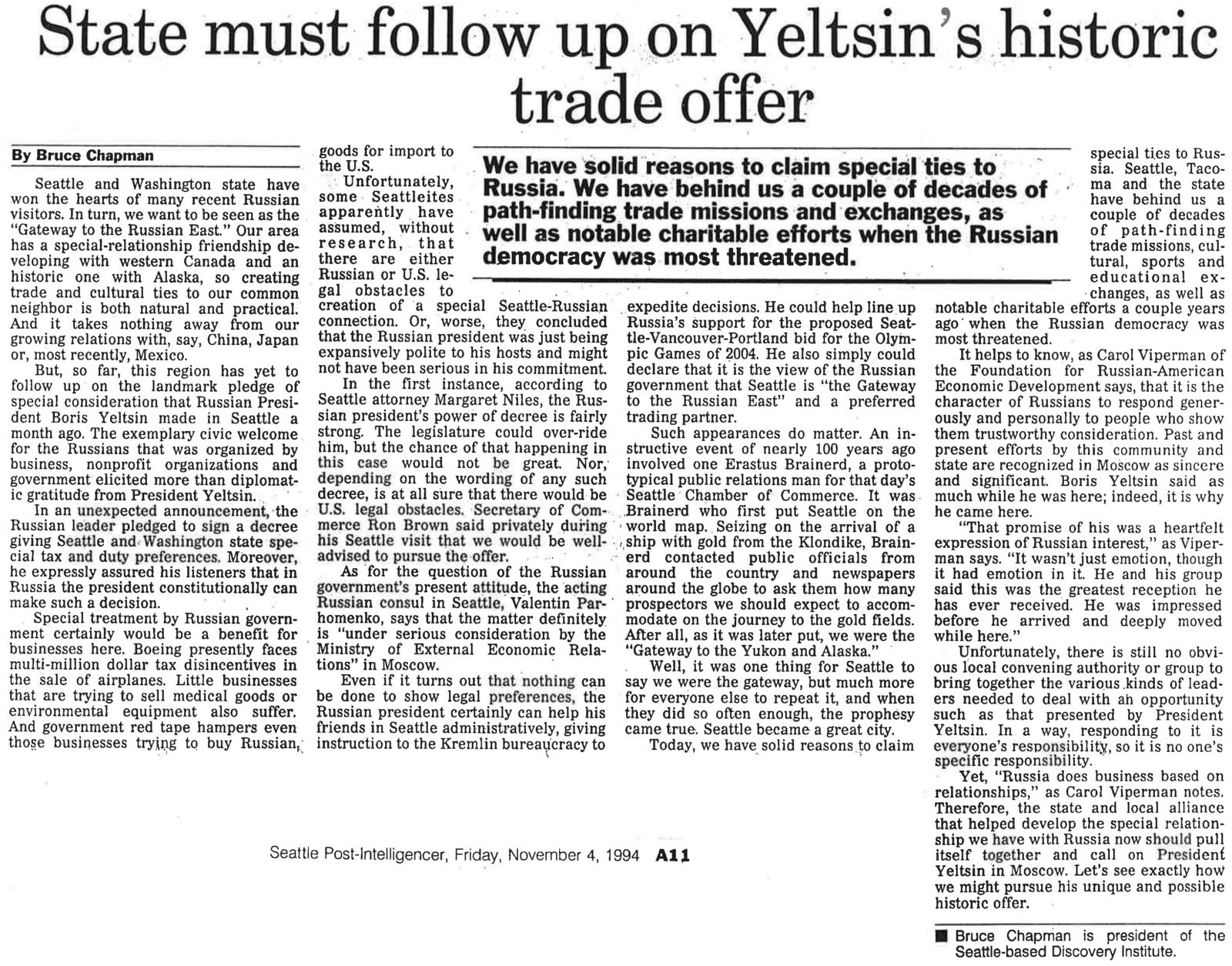State must follow up on Yeltsin’s historic trade offer
Originally published at Seattle Post-IntelligencerSeattle and Washington state have won the hearts of many recent Russian visitors. In turn, we want to be seen as the “Gateway to the Russian East.” Our area has a special-relationship friendship developing with western Canada and an historic one with Alaska, so creating trade and cultural ties to our common neighbor is both natural and practical. And it takes nothing away from our growing relations with say, China, Japan or, most recently, Mexico.
But, so far, this region has yet to follow up on the landmark pledge of special consideration that Russian President Boris Yeltsin made in Seattle a month ago. The exemplary civic welcome for the Russians that was organized by business, nonprofit organizations and government elicited more than diplomatic gratitude from President Yeltsin.
In an unexpected announcement, the Russian leader pledged to sign a decree giving Seattle and Washington state special tax and duty preferences. Moreover, he expressly assured his listeners that in Russia the president constitutionally can make such a decision.
Special treatment by Russian government certainly would be a benefit for businesses here. Boeing presently faces multi-million dollar tax disincentives in the sale of airplanes. Little businesses that are trying to sell medical goods or environmental equipment also suffer. And government red tape hampers even those businesses trying to buy Russian goods for import to the U.S.
Unfortunately, some Seattleites apparently have assumed, without research , that there really either Russian or U.S. legal obstacles to creation of a special Seattle-Russian connection. Or, worse, they concluded that the Russian president was just being expansively polite to his hosts and might not have been serious in his commitment.
In the first instance, according to Seattle attorney Margaret Niles, the Russian president’s power of decree is fairly strong. The legislature could over-ride him, but the chance of that happening in this case would not be great. Nor, depending on the wording of any such decree, is at all sure that there would be U.S. legal obstacles. Secretary of Commerce Ron Brown said privately during his Seattle visit that we would be well-advised to pursue the offer.
As for the question of the Russian government’s present attitude, the acting Russian consul in Seattle, Valentin Parhomenko, says that the matter definitely is “under serious consideration by the ministry of External Economic Relations” in Moscow.
Even if it turns out that nothing can be done to show legal preferences, the Russian president certainly can help his friends in Seattle administratively, giving instructions to the Kremlin bureaucracy to expedite decisions. he could help line up Russia’s support for the proposed Seattle-Vancouver-Portland bid for the Olympic Games of 2004. He also simply could declare that it is the view of the Russian government that Seattle is “the Gateway to the Russian East” and a preferred trading partner.
Such appearances do matter. An instructive event of nearly 100 years ago involved one Erastus Brainerd, a proto-typical public relations man for that day’s Seattle Chamber of Commerce. It was Brainerd who first put Seattle on the world map. Seizing on the arrival of a ship with gold from the Klondike, Brainerd contacted public officials from around the country and newspapers around the globe to ask them how many prospectors we should expect to accommodate on the journey to the gold fields. After all, as it was later put, we were the “Gateway to the Yukon and Alaska.”
Well, it was one thing for Seattle to say we were the gateway, but much more for everyone else to repeat it, and when they did so often enough, the prophesy came true. Seattle became a great city.
Today, we have solid reasons to claim special ties to Russia. Seattle, Tacoma and the state have behind us a couple of decades of path-finding trade missions, cultural, sports and educational exchanges, as well as notable charitable efforts a couple years ago when the Russian democracy was most threatened.
It helps to know, as Carol Viperman of the Foundation for Russian-American Economic Development says, that it is the character of Russians to respond generously and personally to people who show them trustworthy consideration. Past and present efforts by this community and state are recognized in Moscow as sincere and significant. Boris Yeltsin said as much while he was here; indeed, it is why he came here.
“That promise of his was a heartfelt expression of Russian interest,” as Viperman says. “It wasn’t just emotion, though it had emotion in it. He and his group said this was the greatest reception he has ever received. He was impressed before he arrived and deeply moved while here.”
Unfortunately, there is still no obvious local convening authority or group to bring together the various kinds of leaders needed to deal with an opportunity such as that presented by President Yeltsin. In a way, responding to it is everyone’s responsibility.
Yet, “Russia does business based on relationships,” as Carol Viperman notes. Therefore, the state and local alliance that helped develop the special relationship we have with Russia now should pull itself together and call on President Yeltsin in Moscow. Let’s see exactly how we might pursue his unique and possible historic offer.

